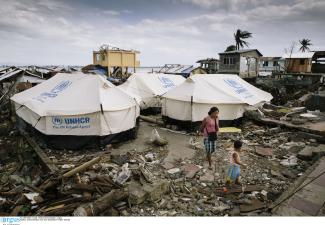Global warming
Be prepared

Weather disasters are becoming more frequent, and their impacts are getting worse. Humanitarian aid must change accordingly, says Patricia Flor, who deals with global issues at Germany’s Foreign Office. The ministry has adopted a new paradigm, she reports, focusing more on long-term preparedness than just delivering aid on short notice.
The German Red Cross has similarly been working on improving preparedness. Christoph Johnen, who heads its department for international cooperation, says adapting to climate change is an essential component of humanitarian aid.
In cooperation with its sister organisations, the Red Crescent, the International Red Cross has established a climate centre in The Hague in the Netherlands. Maarten van Aalst is its director. He wants to make the general public more aware of climate change, rather than merely discussing matters among experts. In his experience, Taiphoon Haiyan has had a great impact on public opinion. He says that disaster forecasts have become more reliable, but regrets such knowledge has hardly contributed to reducing harm so far.
There is certainly no lack of data. Munich Re, the reinsurance giant, is running an important data bank for instance. Peter Höppe, one of the corporation’s leading risk managers, says it covers some 34,000 events. According to him, 88 % of the natural calamities that hit humankind in the years 1980 to 2013 originated in the atmosphere. He adds that the poor are normally hit worst, and that they depend on donors’ aid because they cannot afford insurance. Höppe demands that insurance to manage climate risks in poor countries must be on the agenda of UN climate negotiations.
Kerstin Rosenow-Williams of the Ruhr University in Bochum is doing research on how non-governmental organisations are responding to global warming. She notes that humanitarian agencies began hiring climate experts about one and a half decades ago. In her eyes, that results from the growing need to assess local and regional climate risks.
She says that there are many comparatively minor weather disasters that the international media do not cover. Accordingly, they do not get much donor attention. Rosenow-Williams points out that local staff must be prepared for such calamities. According to her, there are best practices that can be copied in other world regions. The emphasis, she insists, must always be on developing local-level capacities.
In spite of various measures to adapt communities to climate change, not all people will be able to stay in their homes, warns Walter Kälin of the Swiss and Norwegian Nansen Initiative, which has the mission to take care of people who are displaced by climate change. According to Kälin, some 144 million people fled their homes because of weather events in the years 2008 to 2012. He adds that some places, including some Pacific islands, will become uninhabitable because of the rising sea level.
Kälin demands precaution now. He wants research to be done on where people will be displaced and where they can settle in the long run. Evacuations should be planned early and managed diligently, he says, since chaotic migration will only compound problems.
A recent conference that was hosted by the Red Cross and the Foreign Office in Berlin summarised several lessons regarding climate change and humanitarian aid:
- A lot of data and statistics on climate matters are available, and predictions of disasters have become more precise.
- Humanitarian agencies, however, are not using such information properly, and, to some extent, they still cannot read the data.
- Relevant information should be made available to humanitarian agencies in a way they can understand, and the agencies must spell out what kind of information they need.
- The funds for humanitarian aid in climate disasters must not be contributed from programmes designed for climate-change mitigation or adaptation to the phenomenon. It must be additional money.
Sabine Balk








